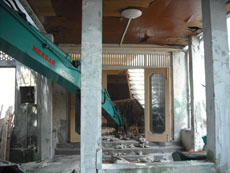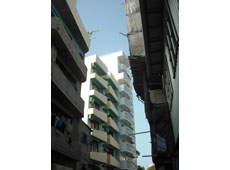The Residential Properties Bill intended to regulate the housing rental industry has been accepted by Parliament.
Independent MP for Kulhudhuffushi-South, Mohamed Nasheed originally presented the bill to the Parliament in November 2009, which aims to protect the rights of both tenants and landlords. It has been in the queue system since.
The bill was widely based upon the Residential Tenancies Act (1987) of New South Wales, Australia, and proposes the creation of a tenancy deposit scheme, with deposits made at the start of a tenancy to be held by the government rather than individual landlords.
There would be a limit on how much the deposit could be and tenants would have the right to appeal if they believe they are not getting a fair rental price.
When he first presented the bill in 2009, Nasheed told Minivan News stricter housing regulations are necessary in a city as overcrowded as Malé, where demand for accommodation dramatically outstrips supply, leaving tenants vulnerable to unscrupulous landlords.
Even then, Nasheed admitted the bill was controversial and said he was unsure it would be passed as it was, but now that it has been accepted by the Majlis, Nasheed said he has “greater hope that a compromise will be reached between those who agree with it and those who don’t.”
“I basically looked at it from a consumer protection point of view,” he said. “So far [housing] has been regulated by ordinary terms of contract.”
Nasheed said he wanted to protect the rights of both the tenant and the landlord, and hopes the bill will help the market by leaving “less room for undue influence.”
The bill was accepted by 45 votes, “seven votes above majority,” Nasheed noted. It will now be sent to a committee before being sent back to Parliament for approval.
“I hope it will all be over in six months,” Nasheed added.

A holistic approach to the housing crisis
Minister for Housing, Transport and Environment, Mohamed Alsam, said the bill “has got rather ridiculous things in it. It’s very foolish to control the market.”
Aslam said the government was trying a more “holistic approach” to the housing crisis in Malé by “diverting demand elsewhere.”
He said the best thing to do was to improve services in other islands and provinces, so people would want to move out of Malé and back to their homes.
“It’s a national development issue,” he said. “Other parts of the country aren’t attractive enough.”
Aslam said that is where the government’s decentralisation plan comes into play. “We have always seen the issue of housing as a broad development issue, not an isolated thing. If we leave Malé as it is, no law will regulate it.”
Although the minister did admit “certain elements of [the bill] are good,” he said “I don’t think I would go with it.”
Housing in Malé
With a growing population of over 100,000, Malé is among the most densely populated cities on the planet, and the housing crisis is only getting worse as more people migrate from other islands and demands grow, allowing rental prices to spike.
Due to the high demand and low supply for housing in Malé, many people who own land choose to rent it out for extra income, either by renting a part of their house or giving the land for the construction of apartment buildings.
A 2008 report by the Human Rights Commission of the Maldives (HRCM) found that 68 percent of families in Malé were living in accommodation that “qualifies as slums by UN definitions.”
Additionally, they found survey participants spent 85 percent of their income on rent and utilities in Malé and Vilingili. They also found some landlords were increasing rent “at will” and forcibly evicting tenants if they were unable to meet their ever-increasing demands.
Effects of overcrowded areas
There are many other issues with overpopulation besides money and rental control; health problems, psychological welfare and even sexual abuse have all been directly connected to living in overcrowded areas.
Dr Jorge Mario Luna, World Health Organization (WHO) representative to the Maldives, wrote: “Several social problems are also faced within the household including child abuse, psychological impact in growing up in areas of overcrowding, breakdown of many families due to the hardship faced by them stimulating a ripple effect of social disorder for the families, particularly the children caught in the situation.”

Dr Luna added: “It is important to note that the major drivers, or social determinants, of health in urban settings are beyond the health sector, including physical infrastructure, access to social and health services, local governance, and the distribution of income and educational opportunities.”